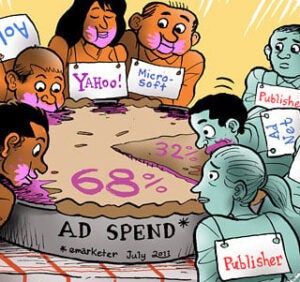Update: The below story has some missing information and an inaccuracy. Rather than edit it, we’ve created a new post with a short technical explanation of how frequency capping and impression tracking *do* work on the Facebook Exchange. In our opinion the error doesn’t detract much from the below analysis, so we hope you’ll read on.
Original story: Agencies have begun to probe how the DSP-powered Facebook Exchange will work, and they see challenges.
The system uses a cookie-matching process that may prevent ad buyers from doing some of the granular bidding and integrated tracking they’re used to in online display, says Facebook and agency sources. In particular, advertisers probably won’t be able to track view-throughs or impressions, or set frequency caps.
Sean Kegelman, EVP Partnerships for Vivaki, is among the senior agency execs still gleaning details from Facebook on key aspects of the model. Based on the early signals from Facebook and its eight DSP partners, he said concluded the channel must be managed separately from their standardized display ad management – at least initially.
“What we’re finding so far is this is going to have to be done on a one-off basis compared to how the majority of real-time bidding works,” said Kegelman.
And it’s not only the serving and tracking that prevent an integrated workflow between Facebook bidded inventory and the rest of the display ecosystem. The creative is complicated too, since advertisers will need to upload the ads (native Facebook formats) directly to Facebook. Then those ads must await approval through a hybrid automated/human process before they can be trafficked – again by Facebook’s servers, not the DSP partners.
While some of Facebook’s approvd DSPs, such as MediaMath, have already added the Facebook Exchange as an option on their dashboards, customers can’t simply “turn on” Facebook distribution for their existing campaigns. Hence Facebook’s version of RTB is not exactly real-time.
The Good Parts
While disappointing to marketers, the absence of integrated reporting and the apparent need for quotation marks around “RTB” shouldn’t detract from the milestone represented by the Facebook Exchange – namely, is the decision by a key global consumer platform to join the society of third party data and ad serving practitioners.
Facebook’s move will allow new sources of demand to flow into the company’s vast inventory, and could accelerate the migration of budgets to targeted display. Cookies degrade quickly, and it’s not easy for performance-driven online marketers to locate their site visitors elsewhere at scale. With successful retargeting at Facebook’s scale, ad buyers say there’s an opportunity for more marketers to realize the benefits of retargeting.
AdExchanger Daily
Get our editors’ roundup delivered to your inbox every weekday.
Daily Roundup
And many say Facebook ad performance is bound to improve, which is key not only for Facebook itself but for the direct marketers who have long wanted to make more of its vast audience.
Christopher Hansen, president of Netmining, says, “Facebook’s ads have shown a lot of value for brand awareness, but we hear from buyers that they haven’t performed as well for direct response efforts. The Facebook Exchange will very likely change this, due to the combination of Facebook display inventory with cookie data from outside the network.”
Analysts Weigh In
From the standpoint of Facebook’s business, IDC analyst Karsten Weide says, “This product initiative is a smart one and extremely interesting.”
Primarily, Weide contends that Facebook’s advertising effectiveness is, “despite attempts to prove otherwise, terrible. Retargeting however turns even low-quality inventory into a moneymaker.”
The potential upside is huge for Facebook because it would make its inventory much more sellable to begin with, and would also increase the eCPM rates at which it can be sold. “This would be good news for Facebook at a time when both the industry and Wall Street realize that Facebook’s growth prospects are somewhat limited,” he added.
Earlier this week, comScore released its own Facebook study, which attempted to measure the marketing value of being associated with the social network. Most major brands on Facebook achieve a monthly Amplification Ratio of between 0.5 and 2.0, meaning that they extend the reach of their earned media exposure of “Fans to Friends of Fans” by 50 to 200 percent.
That by itself isn’t worth much, but comScore suggests the numbers could likely be improved by focusing on tactics to enhance Fan Reach and Engagement or by supplementing with paid display campaigns, such as Sponsored Stories and Promoted Page Posts (Paid).
And that’s part of what makes the prospect of the Facebook Exchange so intriguing.
For example, comScore found that Facebook users exposed to Starbucks messages were 38 percent more likely than the typical Facebook user to make a purchase in the four weeks that followed. Not bad, though Starbucks is an easy get for a quick stop restaurant. Still, Target saw the needle move with a Facebook ad presence, as comScore counted a 21 percent lift over the same four weeks.
Ultimately, the impact the Facebook Exchange could have on the display space depends on how many clients will sign up. And with a growing membership of 900 million active users, it’s a safe bet that this service should attract even more marketers’ spending and attention.
Google Impact
As AdExchanger reported yesterday, Google’s Invite Media appears to be excluded from bidding on the Facebook Exchange, which will sync up with eight other big and small DSPs. This creates a unique challenge for Google, given Facebook’s audience clout and could ultimately lead to new “favorites” in the display ad arms race.
The overarching argument for Google’s primacy in display advertising has always been its platform obsession. If it owns the pipes of online display, it will benefit even when the media sold is not its own. But what happens when the water utility can’t reach the new aquifer?
For Vivaki, a close partner to Invite Media (recently renamed DoubleClick Bid Manager), the exclusion of its preferred DSP from Facebook’s new private biddable marketplace is disappointing. “Double Bid Manager is what we and the market sees as probably the best DSP out there,” Kegelman said.
-Zach Rodgers and David Kaplan
















